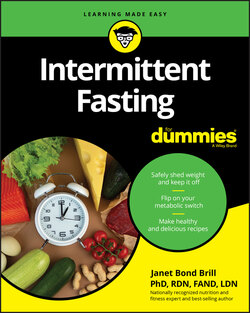Читать книгу Intermittent Fasting For Dummies - Janet Bond Brill - Страница 20
Answering Your Frequently Asked Questions
ОглавлениеIntermittent fasting is right for anyone seeking a longer, healthier life. However, as a new phenomenon, you may have a host of questions that you want answered to help you determine whether intermittent fasting is right for you. Here are some common questions and answers to help you make that decision:
Is hunger hard to deal with when practicing intermittent fasting? In the beginning, you’ll feel hunger pangs during your fasting periods. Most intermittent fasting newbies figure out how to accept, adjust, and dull hunger pangs, which typically dissipate after about a month on an intermittent fasting program. I explore how you can deal with the potential negative side effects of intermittent fasting in depth in Chapter 15.
Do you have to exercise when practicing intermittent fasting? Yes, but no marathons are required! All Americans need to move more for better health. Because you’re entering into a lifestyle program aimed at improving your health, this one does indeed advocate daily exercise. Chapter 14 explores the specifics on exercise.
How long should you fast for? You’ll see health benefits from fasts of from 14 hours to 36 hours. The ideal fasting window and ultimately fasting regimen will vary depending on you. What matters is the duration of fasting that works for your lifestyle.
Can you drink alcohol when practicing intermittent fasting? Yes, you can during your eating windows, in moderation, and if you can drink responsibly. You should know that drinking any amount of alcohol increases your risk of seven different types of cancer.
Can you have a cheat day during intermittent fasting? One of the phenomenal attractions of intermittent fasting is the concept that you get lots of cheat days — built in. Technically, you can eat whatever you want during your eating windows. This simple idea of freedom in eating is very motivating — fast today for tomorrow you feast!
Can you gain muscle when practicing intermittent fasting? Yes, studies have shown that combining intermittent fasting with a program of strength-training designed to increase muscle mass will result in muscle gain and fat loss. For details on how to gain muscle while practicing intermittent fasting, flip to Chapter 14.WHAT DID THE CAVEMAN REALLY EAT? THINK OINK, OINKWell, it sure wasn’t filet mignon! Human ancestors evolved as hunters and gatherers; for hundreds of thousands of years, their lives were spent searching for food. Believe it or not, some scientists believe that early humans had a diet like pigs. (Pigs are omnivores, meaning they consume both plants and animals. In the wild, they forage for anything and everything edible such as leaves, roots, fruits, flowers, insects, and fish.) What can be said for certain is that in the Paleolithic age, the human diet varied immensely by geography, season, and opportunity. Humans were flexible eaters, opportunistic eaters who ate what was available depending on their geographic locale. For example, humans in the Arctic ate almost all animal foods (seafood), whereas populations in the Andes sustained themselves on primarily plant foods (tubers and cereal grains).
Can you take medications and supplements when practicing intermittent fasting? Yes, you must continue taking your prescription medications as directed (and should only practice intermittent fasting under the guidance of your personal healthcare provider). If you need to take your meds with food, on a daily basis, choose an intermittent fasting plan that allows a daily window of eating for your medications. Supplements, as long as they contain negligible calories, can be taken as usual. Check with your healthcare provider if you have any concerns.
